Evolution of Strategic Thoughts: Letter to Carl Von Clausewitz
VerifiedAdded on 2022/08/22
|11
|2995
|13
Homework Assignment
AI Summary
This assignment is a letter addressed to Carl Von Clausewitz, discussing the evolution of strategic thoughts, particularly his theories on war and strategy. The student analyzes Clausewitz's concepts, including the Trinitarian war model, and provides their own analysis and opinions on the subject. The assignment explores the existing debate surrounding Clausewitz's ideas, referencing his book 'On War' and its influence on military strategy. It highlights the importance of understanding warfare and the application of strategic principles in various contexts, including business. The letter also critiques and discusses the relevance of Clausewitz's theories in the modern era, considering different perspectives on the Trinitarian war model and its practical applications. The assignment emphasizes the importance of leadership, discipline, and adapting strategies to specific situations and environments. The student incorporates course readings and other sources to support their arguments.
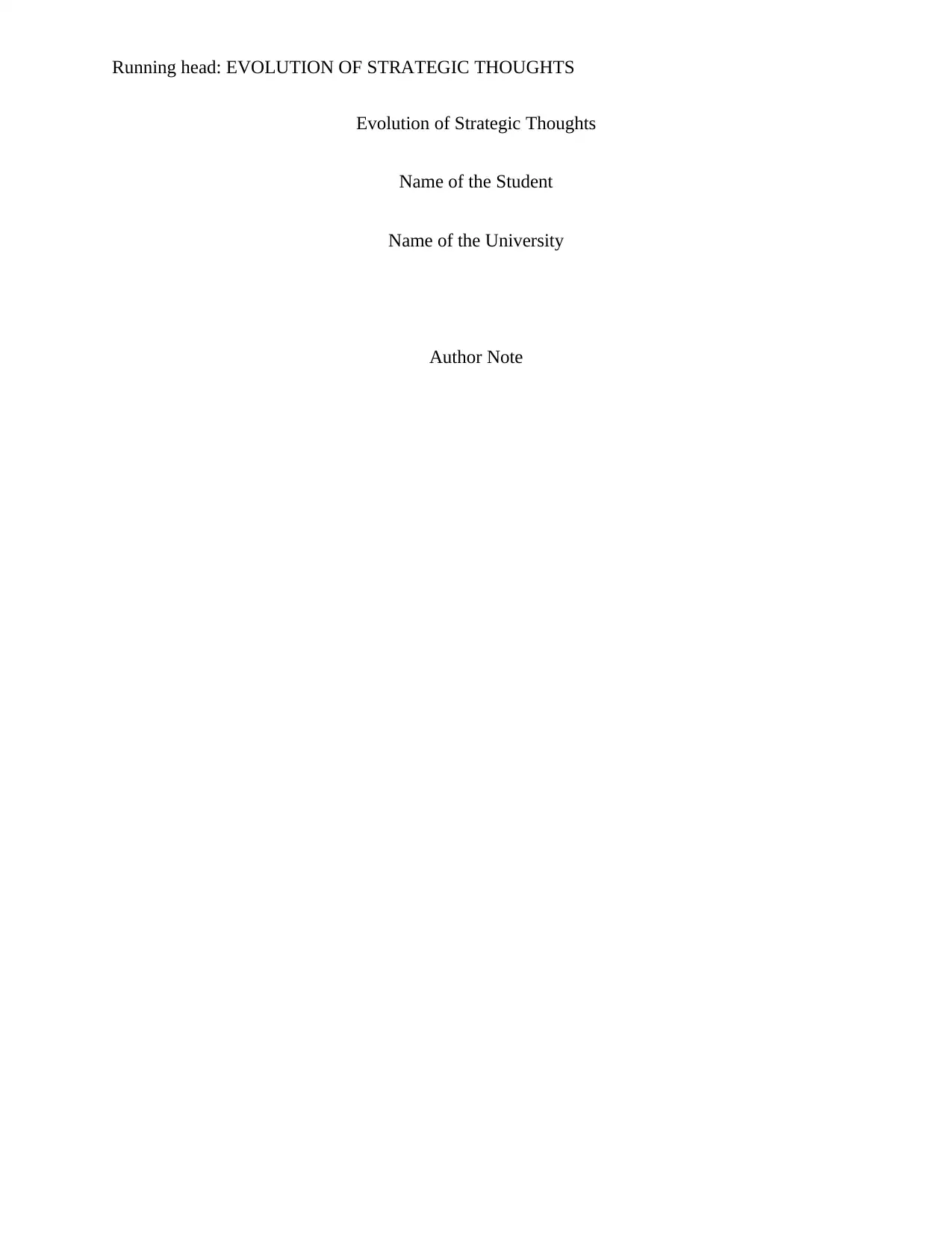
Running head: EVOLUTION OF STRATEGIC THOUGHTS
Evolution of Strategic Thoughts
Name of the Student
Name of the University
Author Note
Evolution of Strategic Thoughts
Name of the Student
Name of the University
Author Note
Paraphrase This Document
Need a fresh take? Get an instant paraphrase of this document with our AI Paraphraser
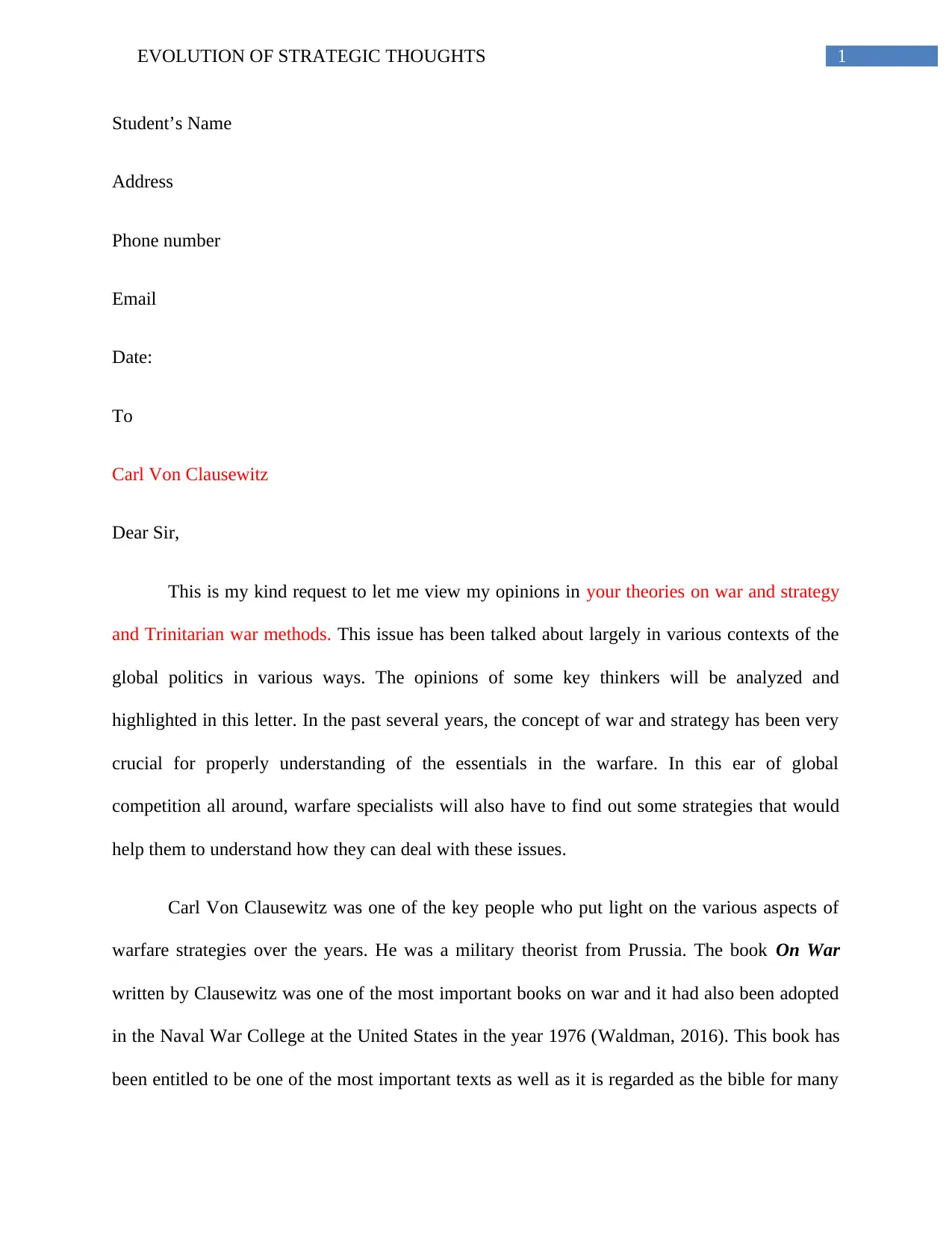
1EVOLUTION OF STRATEGIC THOUGHTS
Student’s Name
Address
Phone number
Email
Date:
To
Carl Von Clausewitz
Dear Sir,
This is my kind request to let me view my opinions in your theories on war and strategy
and Trinitarian war methods. This issue has been talked about largely in various contexts of the
global politics in various ways. The opinions of some key thinkers will be analyzed and
highlighted in this letter. In the past several years, the concept of war and strategy has been very
crucial for properly understanding of the essentials in the warfare. In this ear of global
competition all around, warfare specialists will also have to find out some strategies that would
help them to understand how they can deal with these issues.
Carl Von Clausewitz was one of the key people who put light on the various aspects of
warfare strategies over the years. He was a military theorist from Prussia. The book On War
written by Clausewitz was one of the most important books on war and it had also been adopted
in the Naval War College at the United States in the year 1976 (Waldman, 2016). This book has
been entitled to be one of the most important texts as well as it is regarded as the bible for many
Student’s Name
Address
Phone number
Date:
To
Carl Von Clausewitz
Dear Sir,
This is my kind request to let me view my opinions in your theories on war and strategy
and Trinitarian war methods. This issue has been talked about largely in various contexts of the
global politics in various ways. The opinions of some key thinkers will be analyzed and
highlighted in this letter. In the past several years, the concept of war and strategy has been very
crucial for properly understanding of the essentials in the warfare. In this ear of global
competition all around, warfare specialists will also have to find out some strategies that would
help them to understand how they can deal with these issues.
Carl Von Clausewitz was one of the key people who put light on the various aspects of
warfare strategies over the years. He was a military theorist from Prussia. The book On War
written by Clausewitz was one of the most important books on war and it had also been adopted
in the Naval War College at the United States in the year 1976 (Waldman, 2016). This book has
been entitled to be one of the most important texts as well as it is regarded as the bible for many
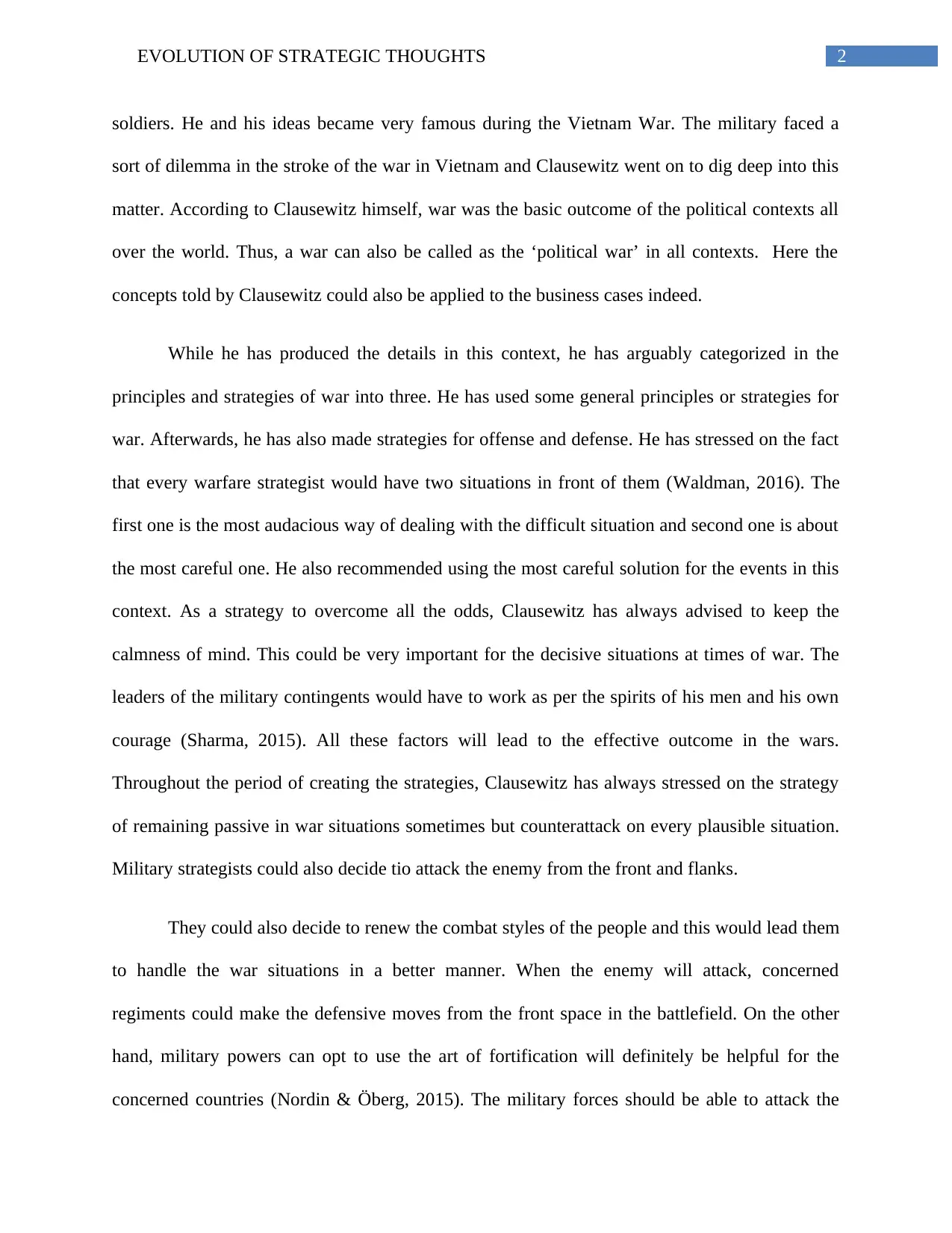
2EVOLUTION OF STRATEGIC THOUGHTS
soldiers. He and his ideas became very famous during the Vietnam War. The military faced a
sort of dilemma in the stroke of the war in Vietnam and Clausewitz went on to dig deep into this
matter. According to Clausewitz himself, war was the basic outcome of the political contexts all
over the world. Thus, a war can also be called as the ‘political war’ in all contexts. Here the
concepts told by Clausewitz could also be applied to the business cases indeed.
While he has produced the details in this context, he has arguably categorized in the
principles and strategies of war into three. He has used some general principles or strategies for
war. Afterwards, he has also made strategies for offense and defense. He has stressed on the fact
that every warfare strategist would have two situations in front of them (Waldman, 2016). The
first one is the most audacious way of dealing with the difficult situation and second one is about
the most careful one. He also recommended using the most careful solution for the events in this
context. As a strategy to overcome all the odds, Clausewitz has always advised to keep the
calmness of mind. This could be very important for the decisive situations at times of war. The
leaders of the military contingents would have to work as per the spirits of his men and his own
courage (Sharma, 2015). All these factors will lead to the effective outcome in the wars.
Throughout the period of creating the strategies, Clausewitz has always stressed on the strategy
of remaining passive in war situations sometimes but counterattack on every plausible situation.
Military strategists could also decide tio attack the enemy from the front and flanks.
They could also decide to renew the combat styles of the people and this would lead them
to handle the war situations in a better manner. When the enemy will attack, concerned
regiments could make the defensive moves from the front space in the battlefield. On the other
hand, military powers can opt to use the art of fortification will definitely be helpful for the
concerned countries (Nordin & Öberg, 2015). The military forces should be able to attack the
soldiers. He and his ideas became very famous during the Vietnam War. The military faced a
sort of dilemma in the stroke of the war in Vietnam and Clausewitz went on to dig deep into this
matter. According to Clausewitz himself, war was the basic outcome of the political contexts all
over the world. Thus, a war can also be called as the ‘political war’ in all contexts. Here the
concepts told by Clausewitz could also be applied to the business cases indeed.
While he has produced the details in this context, he has arguably categorized in the
principles and strategies of war into three. He has used some general principles or strategies for
war. Afterwards, he has also made strategies for offense and defense. He has stressed on the fact
that every warfare strategist would have two situations in front of them (Waldman, 2016). The
first one is the most audacious way of dealing with the difficult situation and second one is about
the most careful one. He also recommended using the most careful solution for the events in this
context. As a strategy to overcome all the odds, Clausewitz has always advised to keep the
calmness of mind. This could be very important for the decisive situations at times of war. The
leaders of the military contingents would have to work as per the spirits of his men and his own
courage (Sharma, 2015). All these factors will lead to the effective outcome in the wars.
Throughout the period of creating the strategies, Clausewitz has always stressed on the strategy
of remaining passive in war situations sometimes but counterattack on every plausible situation.
Military strategists could also decide tio attack the enemy from the front and flanks.
They could also decide to renew the combat styles of the people and this would lead them
to handle the war situations in a better manner. When the enemy will attack, concerned
regiments could make the defensive moves from the front space in the battlefield. On the other
hand, military powers can opt to use the art of fortification will definitely be helpful for the
concerned countries (Nordin & Öberg, 2015). The military forces should be able to attack the
⊘ This is a preview!⊘
Do you want full access?
Subscribe today to unlock all pages.

Trusted by 1+ million students worldwide
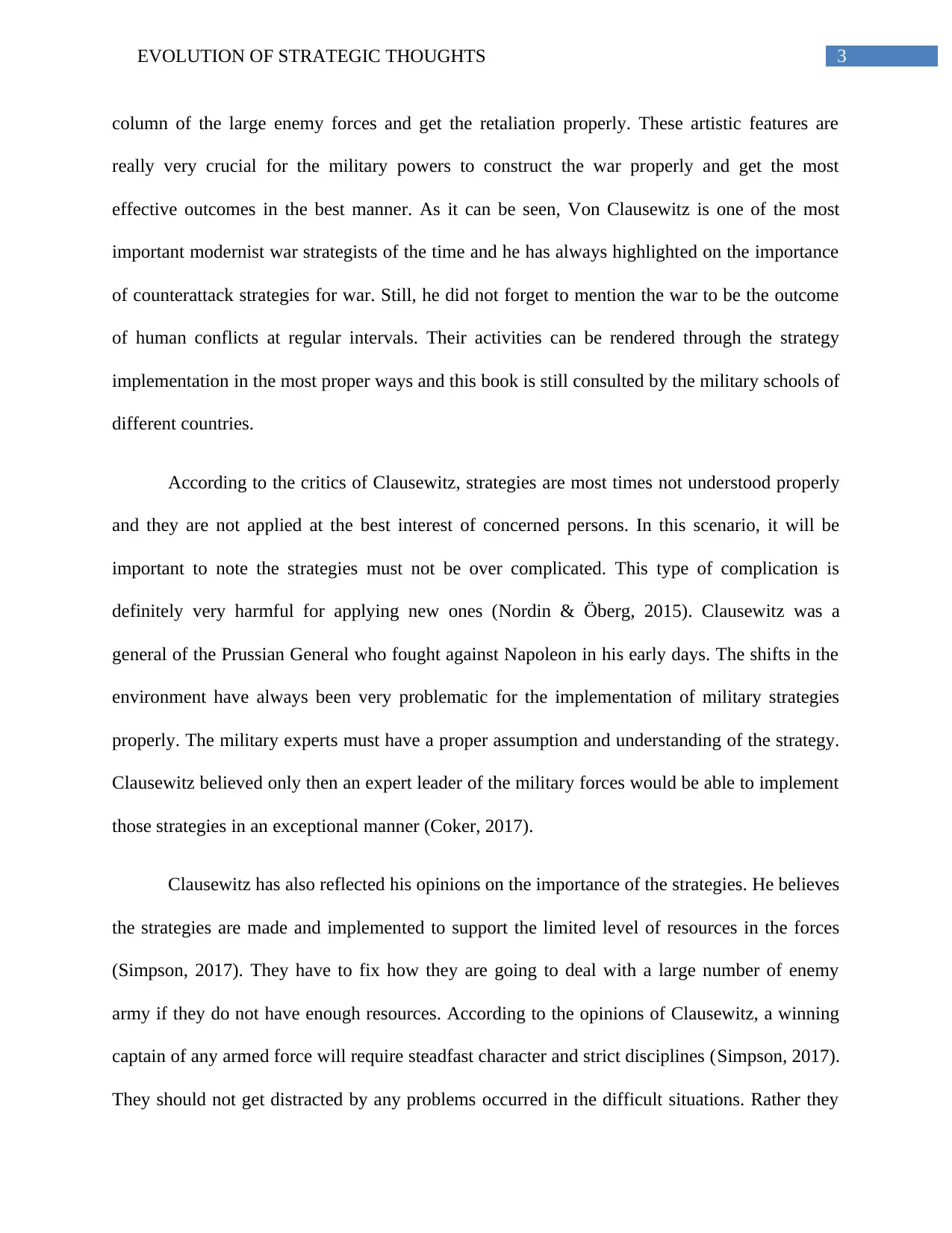
3EVOLUTION OF STRATEGIC THOUGHTS
column of the large enemy forces and get the retaliation properly. These artistic features are
really very crucial for the military powers to construct the war properly and get the most
effective outcomes in the best manner. As it can be seen, Von Clausewitz is one of the most
important modernist war strategists of the time and he has always highlighted on the importance
of counterattack strategies for war. Still, he did not forget to mention the war to be the outcome
of human conflicts at regular intervals. Their activities can be rendered through the strategy
implementation in the most proper ways and this book is still consulted by the military schools of
different countries.
According to the critics of Clausewitz, strategies are most times not understood properly
and they are not applied at the best interest of concerned persons. In this scenario, it will be
important to note the strategies must not be over complicated. This type of complication is
definitely very harmful for applying new ones (Nordin & Öberg, 2015). Clausewitz was a
general of the Prussian General who fought against Napoleon in his early days. The shifts in the
environment have always been very problematic for the implementation of military strategies
properly. The military experts must have a proper assumption and understanding of the strategy.
Clausewitz believed only then an expert leader of the military forces would be able to implement
those strategies in an exceptional manner (Coker, 2017).
Clausewitz has also reflected his opinions on the importance of the strategies. He believes
the strategies are made and implemented to support the limited level of resources in the forces
(Simpson, 2017). They have to fix how they are going to deal with a large number of enemy
army if they do not have enough resources. According to the opinions of Clausewitz, a winning
captain of any armed force will require steadfast character and strict disciplines (Simpson, 2017).
They should not get distracted by any problems occurred in the difficult situations. Rather they
column of the large enemy forces and get the retaliation properly. These artistic features are
really very crucial for the military powers to construct the war properly and get the most
effective outcomes in the best manner. As it can be seen, Von Clausewitz is one of the most
important modernist war strategists of the time and he has always highlighted on the importance
of counterattack strategies for war. Still, he did not forget to mention the war to be the outcome
of human conflicts at regular intervals. Their activities can be rendered through the strategy
implementation in the most proper ways and this book is still consulted by the military schools of
different countries.
According to the critics of Clausewitz, strategies are most times not understood properly
and they are not applied at the best interest of concerned persons. In this scenario, it will be
important to note the strategies must not be over complicated. This type of complication is
definitely very harmful for applying new ones (Nordin & Öberg, 2015). Clausewitz was a
general of the Prussian General who fought against Napoleon in his early days. The shifts in the
environment have always been very problematic for the implementation of military strategies
properly. The military experts must have a proper assumption and understanding of the strategy.
Clausewitz believed only then an expert leader of the military forces would be able to implement
those strategies in an exceptional manner (Coker, 2017).
Clausewitz has also reflected his opinions on the importance of the strategies. He believes
the strategies are made and implemented to support the limited level of resources in the forces
(Simpson, 2017). They have to fix how they are going to deal with a large number of enemy
army if they do not have enough resources. According to the opinions of Clausewitz, a winning
captain of any armed force will require steadfast character and strict disciplines (Simpson, 2017).
They should not get distracted by any problems occurred in the difficult situations. Rather they
Paraphrase This Document
Need a fresh take? Get an instant paraphrase of this document with our AI Paraphraser
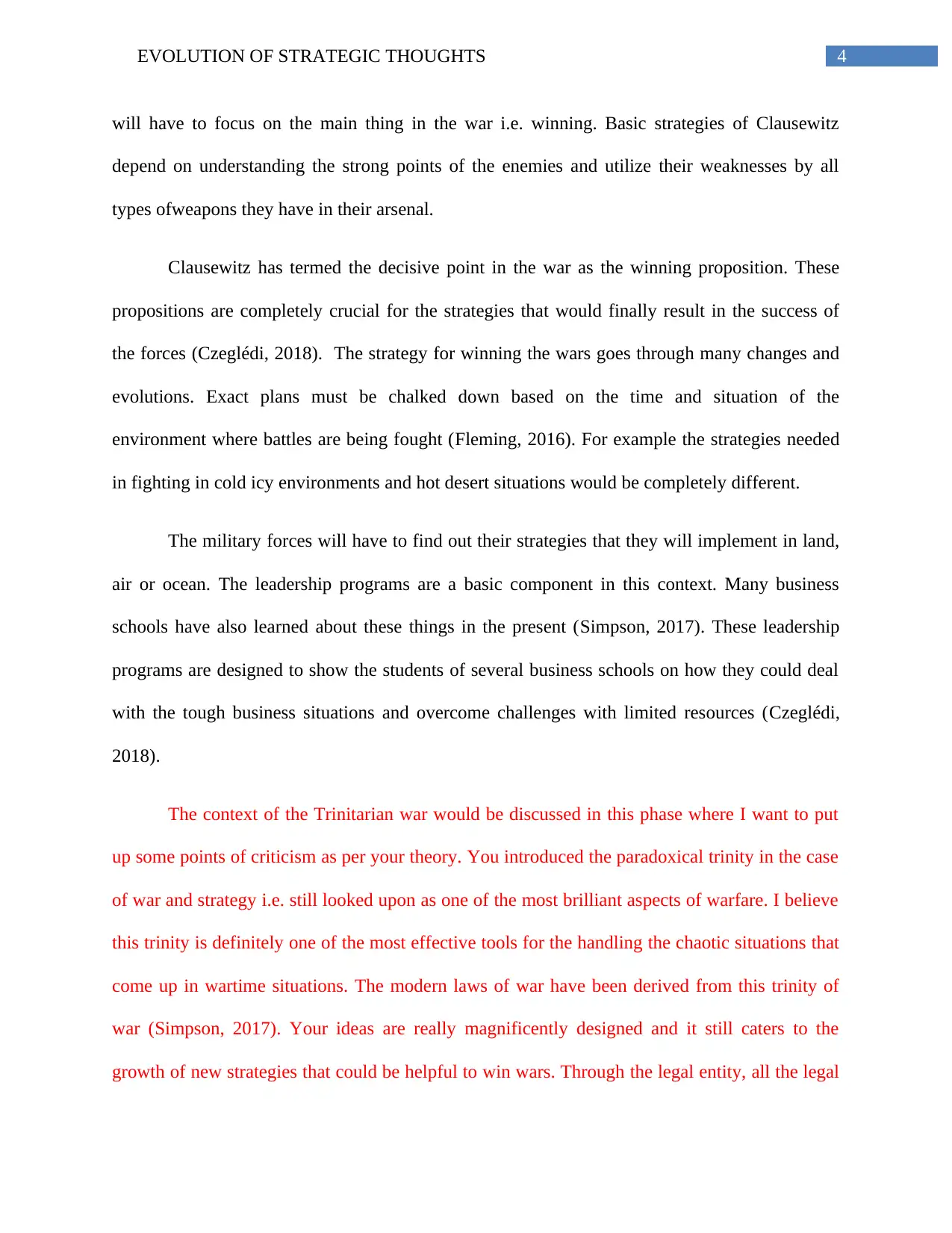
4EVOLUTION OF STRATEGIC THOUGHTS
will have to focus on the main thing in the war i.e. winning. Basic strategies of Clausewitz
depend on understanding the strong points of the enemies and utilize their weaknesses by all
types ofweapons they have in their arsenal.
Clausewitz has termed the decisive point in the war as the winning proposition. These
propositions are completely crucial for the strategies that would finally result in the success of
the forces (Czeglédi, 2018). The strategy for winning the wars goes through many changes and
evolutions. Exact plans must be chalked down based on the time and situation of the
environment where battles are being fought (Fleming, 2016). For example the strategies needed
in fighting in cold icy environments and hot desert situations would be completely different.
The military forces will have to find out their strategies that they will implement in land,
air or ocean. The leadership programs are a basic component in this context. Many business
schools have also learned about these things in the present (Simpson, 2017). These leadership
programs are designed to show the students of several business schools on how they could deal
with the tough business situations and overcome challenges with limited resources (Czeglédi,
2018).
The context of the Trinitarian war would be discussed in this phase where I want to put
up some points of criticism as per your theory. You introduced the paradoxical trinity in the case
of war and strategy i.e. still looked upon as one of the most brilliant aspects of warfare. I believe
this trinity is definitely one of the most effective tools for the handling the chaotic situations that
come up in wartime situations. The modern laws of war have been derived from this trinity of
war (Simpson, 2017). Your ideas are really magnificently designed and it still caters to the
growth of new strategies that could be helpful to win wars. Through the legal entity, all the legal
will have to focus on the main thing in the war i.e. winning. Basic strategies of Clausewitz
depend on understanding the strong points of the enemies and utilize their weaknesses by all
types ofweapons they have in their arsenal.
Clausewitz has termed the decisive point in the war as the winning proposition. These
propositions are completely crucial for the strategies that would finally result in the success of
the forces (Czeglédi, 2018). The strategy for winning the wars goes through many changes and
evolutions. Exact plans must be chalked down based on the time and situation of the
environment where battles are being fought (Fleming, 2016). For example the strategies needed
in fighting in cold icy environments and hot desert situations would be completely different.
The military forces will have to find out their strategies that they will implement in land,
air or ocean. The leadership programs are a basic component in this context. Many business
schools have also learned about these things in the present (Simpson, 2017). These leadership
programs are designed to show the students of several business schools on how they could deal
with the tough business situations and overcome challenges with limited resources (Czeglédi,
2018).
The context of the Trinitarian war would be discussed in this phase where I want to put
up some points of criticism as per your theory. You introduced the paradoxical trinity in the case
of war and strategy i.e. still looked upon as one of the most brilliant aspects of warfare. I believe
this trinity is definitely one of the most effective tools for the handling the chaotic situations that
come up in wartime situations. The modern laws of war have been derived from this trinity of
war (Simpson, 2017). Your ideas are really magnificently designed and it still caters to the
growth of new strategies that could be helpful to win wars. Through the legal entity, all the legal
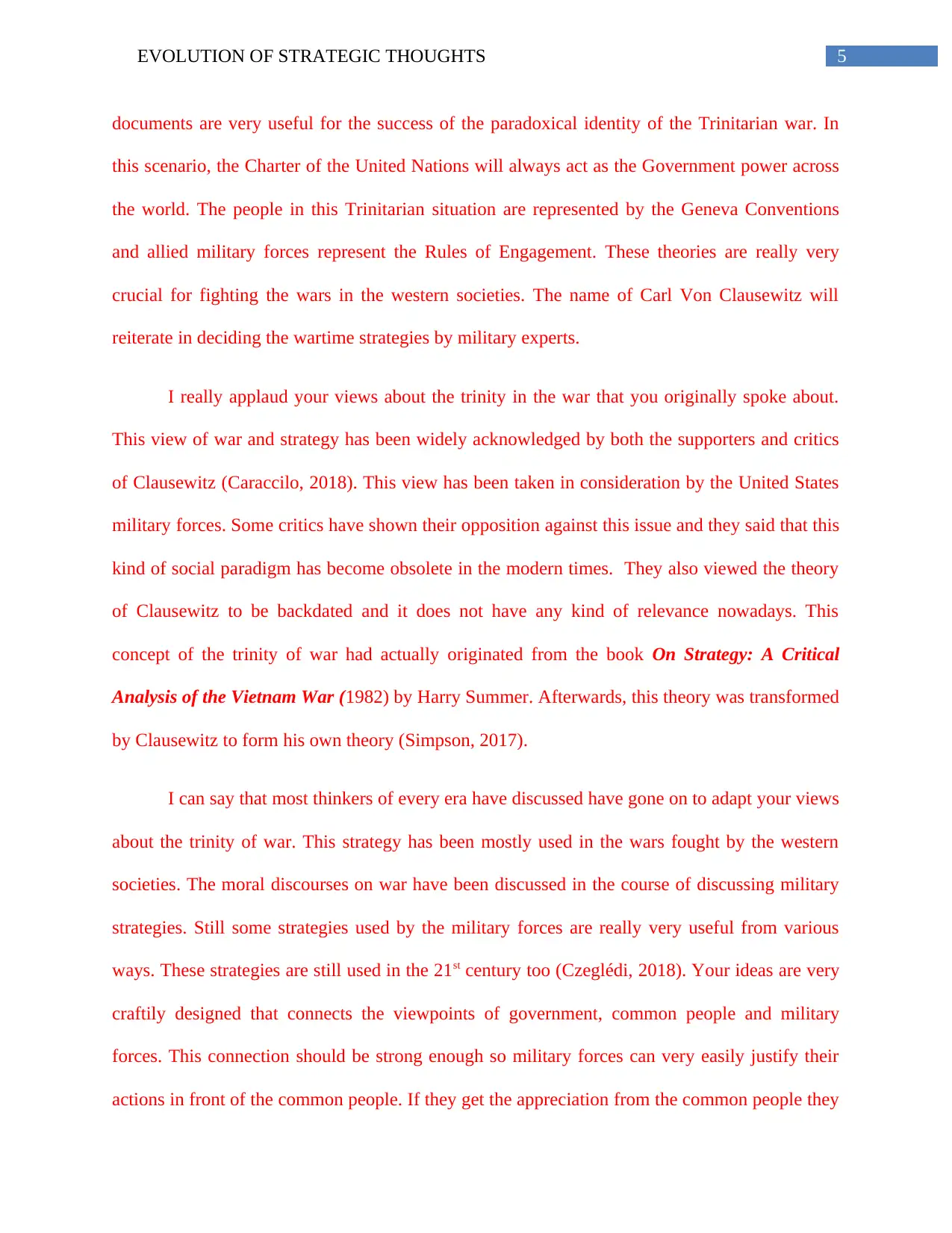
5EVOLUTION OF STRATEGIC THOUGHTS
documents are very useful for the success of the paradoxical identity of the Trinitarian war. In
this scenario, the Charter of the United Nations will always act as the Government power across
the world. The people in this Trinitarian situation are represented by the Geneva Conventions
and allied military forces represent the Rules of Engagement. These theories are really very
crucial for fighting the wars in the western societies. The name of Carl Von Clausewitz will
reiterate in deciding the wartime strategies by military experts.
I really applaud your views about the trinity in the war that you originally spoke about.
This view of war and strategy has been widely acknowledged by both the supporters and critics
of Clausewitz (Caraccilo, 2018). This view has been taken in consideration by the United States
military forces. Some critics have shown their opposition against this issue and they said that this
kind of social paradigm has become obsolete in the modern times. They also viewed the theory
of Clausewitz to be backdated and it does not have any kind of relevance nowadays. This
concept of the trinity of war had actually originated from the book On Strategy: A Critical
Analysis of the Vietnam War (1982) by Harry Summer. Afterwards, this theory was transformed
by Clausewitz to form his own theory (Simpson, 2017).
I can say that most thinkers of every era have discussed have gone on to adapt your views
about the trinity of war. This strategy has been mostly used in the wars fought by the western
societies. The moral discourses on war have been discussed in the course of discussing military
strategies. Still some strategies used by the military forces are really very useful from various
ways. These strategies are still used in the 21st century too (Czeglédi, 2018). Your ideas are very
craftily designed that connects the viewpoints of government, common people and military
forces. This connection should be strong enough so military forces can very easily justify their
actions in front of the common people. If they get the appreciation from the common people they
documents are very useful for the success of the paradoxical identity of the Trinitarian war. In
this scenario, the Charter of the United Nations will always act as the Government power across
the world. The people in this Trinitarian situation are represented by the Geneva Conventions
and allied military forces represent the Rules of Engagement. These theories are really very
crucial for fighting the wars in the western societies. The name of Carl Von Clausewitz will
reiterate in deciding the wartime strategies by military experts.
I really applaud your views about the trinity in the war that you originally spoke about.
This view of war and strategy has been widely acknowledged by both the supporters and critics
of Clausewitz (Caraccilo, 2018). This view has been taken in consideration by the United States
military forces. Some critics have shown their opposition against this issue and they said that this
kind of social paradigm has become obsolete in the modern times. They also viewed the theory
of Clausewitz to be backdated and it does not have any kind of relevance nowadays. This
concept of the trinity of war had actually originated from the book On Strategy: A Critical
Analysis of the Vietnam War (1982) by Harry Summer. Afterwards, this theory was transformed
by Clausewitz to form his own theory (Simpson, 2017).
I can say that most thinkers of every era have discussed have gone on to adapt your views
about the trinity of war. This strategy has been mostly used in the wars fought by the western
societies. The moral discourses on war have been discussed in the course of discussing military
strategies. Still some strategies used by the military forces are really very useful from various
ways. These strategies are still used in the 21st century too (Czeglédi, 2018). Your ideas are very
craftily designed that connects the viewpoints of government, common people and military
forces. This connection should be strong enough so military forces can very easily justify their
actions in front of the common people. If they get the appreciation from the common people they
⊘ This is a preview!⊘
Do you want full access?
Subscribe today to unlock all pages.

Trusted by 1+ million students worldwide
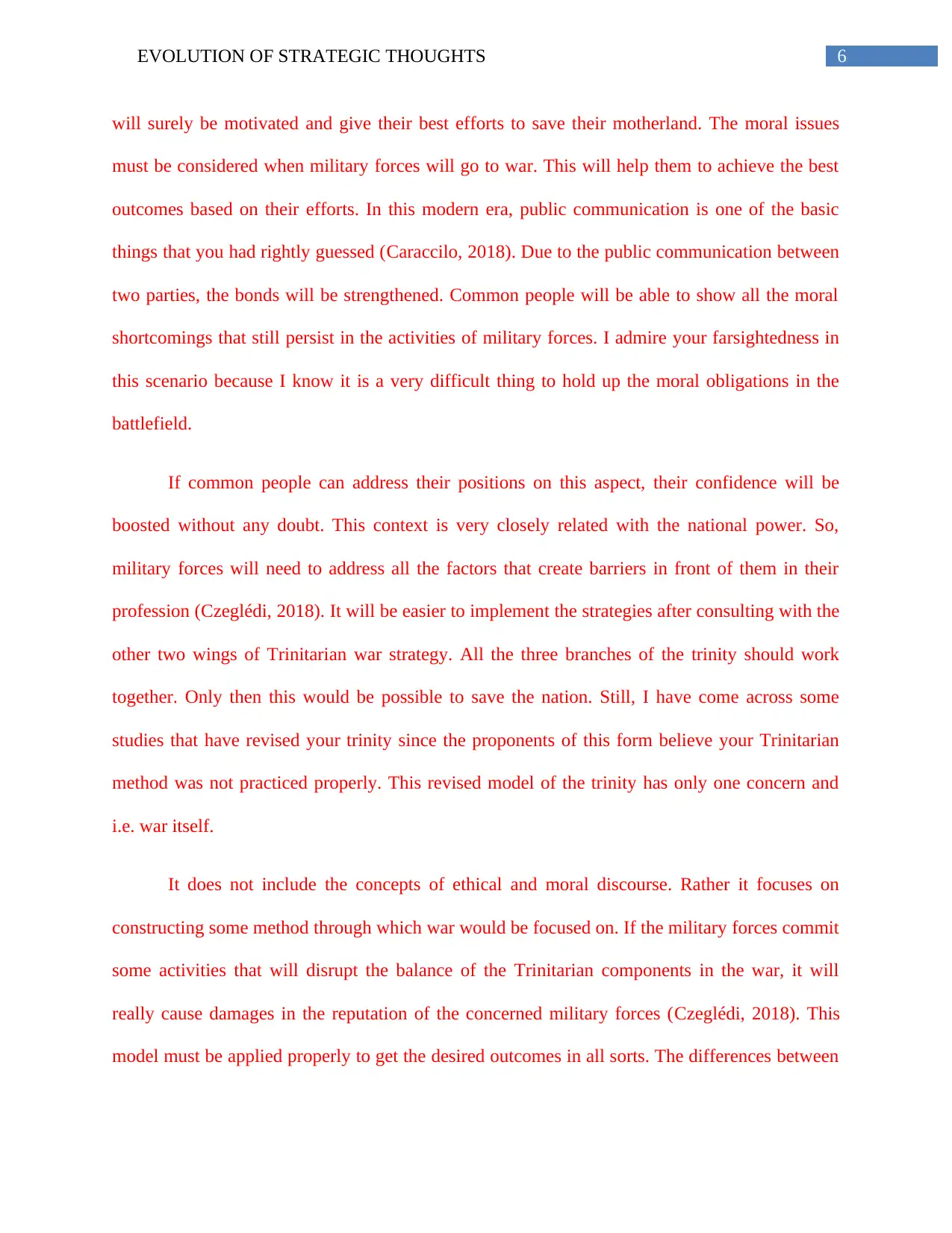
6EVOLUTION OF STRATEGIC THOUGHTS
will surely be motivated and give their best efforts to save their motherland. The moral issues
must be considered when military forces will go to war. This will help them to achieve the best
outcomes based on their efforts. In this modern era, public communication is one of the basic
things that you had rightly guessed (Caraccilo, 2018). Due to the public communication between
two parties, the bonds will be strengthened. Common people will be able to show all the moral
shortcomings that still persist in the activities of military forces. I admire your farsightedness in
this scenario because I know it is a very difficult thing to hold up the moral obligations in the
battlefield.
If common people can address their positions on this aspect, their confidence will be
boosted without any doubt. This context is very closely related with the national power. So,
military forces will need to address all the factors that create barriers in front of them in their
profession (Czeglédi, 2018). It will be easier to implement the strategies after consulting with the
other two wings of Trinitarian war strategy. All the three branches of the trinity should work
together. Only then this would be possible to save the nation. Still, I have come across some
studies that have revised your trinity since the proponents of this form believe your Trinitarian
method was not practiced properly. This revised model of the trinity has only one concern and
i.e. war itself.
It does not include the concepts of ethical and moral discourse. Rather it focuses on
constructing some method through which war would be focused on. If the military forces commit
some activities that will disrupt the balance of the Trinitarian components in the war, it will
really cause damages in the reputation of the concerned military forces (Czeglédi, 2018). This
model must be applied properly to get the desired outcomes in all sorts. The differences between
will surely be motivated and give their best efforts to save their motherland. The moral issues
must be considered when military forces will go to war. This will help them to achieve the best
outcomes based on their efforts. In this modern era, public communication is one of the basic
things that you had rightly guessed (Caraccilo, 2018). Due to the public communication between
two parties, the bonds will be strengthened. Common people will be able to show all the moral
shortcomings that still persist in the activities of military forces. I admire your farsightedness in
this scenario because I know it is a very difficult thing to hold up the moral obligations in the
battlefield.
If common people can address their positions on this aspect, their confidence will be
boosted without any doubt. This context is very closely related with the national power. So,
military forces will need to address all the factors that create barriers in front of them in their
profession (Czeglédi, 2018). It will be easier to implement the strategies after consulting with the
other two wings of Trinitarian war strategy. All the three branches of the trinity should work
together. Only then this would be possible to save the nation. Still, I have come across some
studies that have revised your trinity since the proponents of this form believe your Trinitarian
method was not practiced properly. This revised model of the trinity has only one concern and
i.e. war itself.
It does not include the concepts of ethical and moral discourse. Rather it focuses on
constructing some method through which war would be focused on. If the military forces commit
some activities that will disrupt the balance of the Trinitarian components in the war, it will
really cause damages in the reputation of the concerned military forces (Czeglédi, 2018). This
model must be applied properly to get the desired outcomes in all sorts. The differences between
Paraphrase This Document
Need a fresh take? Get an instant paraphrase of this document with our AI Paraphraser
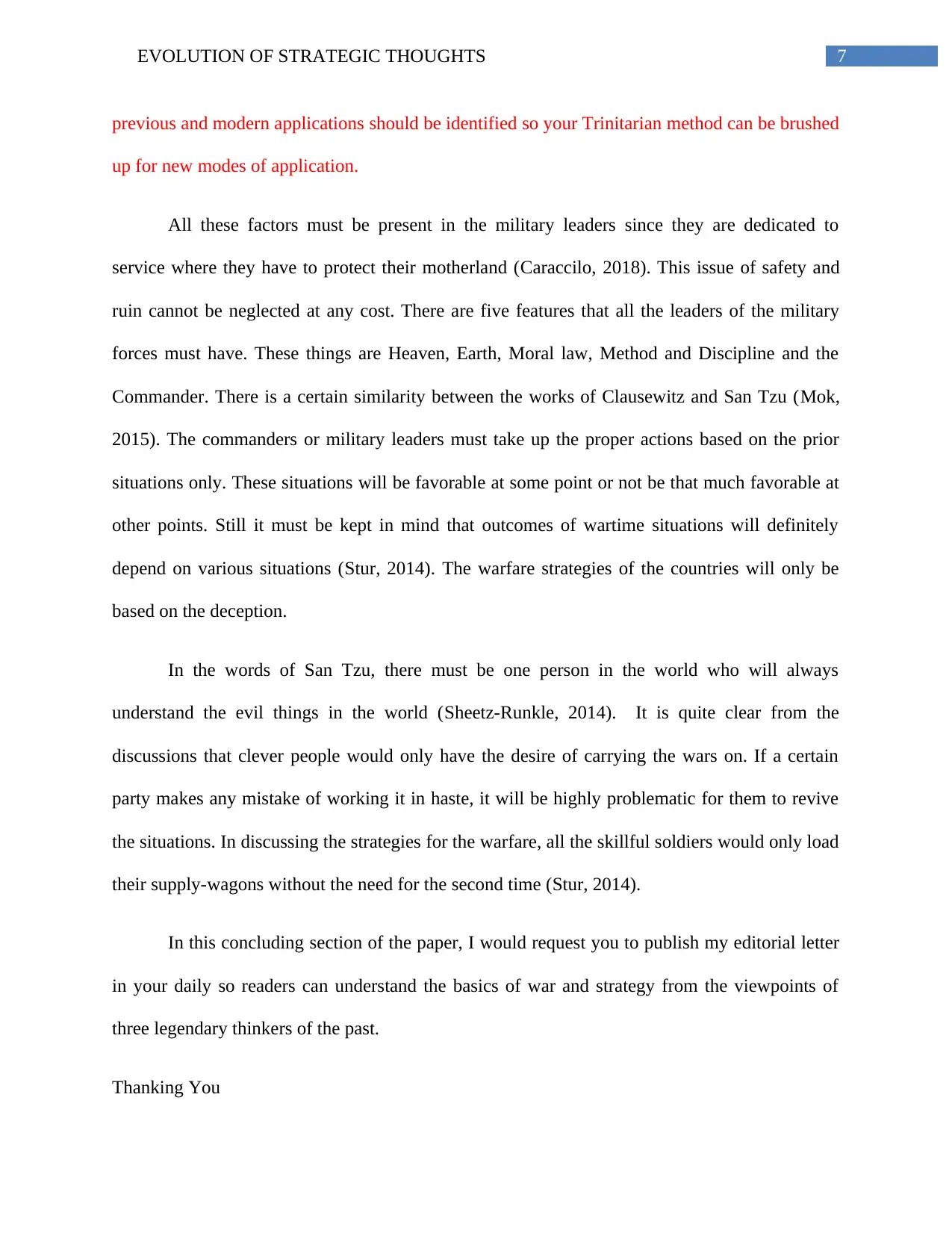
7EVOLUTION OF STRATEGIC THOUGHTS
previous and modern applications should be identified so your Trinitarian method can be brushed
up for new modes of application.
All these factors must be present in the military leaders since they are dedicated to
service where they have to protect their motherland (Caraccilo, 2018). This issue of safety and
ruin cannot be neglected at any cost. There are five features that all the leaders of the military
forces must have. These things are Heaven, Earth, Moral law, Method and Discipline and the
Commander. There is a certain similarity between the works of Clausewitz and San Tzu (Mok,
2015). The commanders or military leaders must take up the proper actions based on the prior
situations only. These situations will be favorable at some point or not be that much favorable at
other points. Still it must be kept in mind that outcomes of wartime situations will definitely
depend on various situations (Stur, 2014). The warfare strategies of the countries will only be
based on the deception.
In the words of San Tzu, there must be one person in the world who will always
understand the evil things in the world (Sheetz-Runkle, 2014). It is quite clear from the
discussions that clever people would only have the desire of carrying the wars on. If a certain
party makes any mistake of working it in haste, it will be highly problematic for them to revive
the situations. In discussing the strategies for the warfare, all the skillful soldiers would only load
their supply-wagons without the need for the second time (Stur, 2014).
In this concluding section of the paper, I would request you to publish my editorial letter
in your daily so readers can understand the basics of war and strategy from the viewpoints of
three legendary thinkers of the past.
Thanking You
previous and modern applications should be identified so your Trinitarian method can be brushed
up for new modes of application.
All these factors must be present in the military leaders since they are dedicated to
service where they have to protect their motherland (Caraccilo, 2018). This issue of safety and
ruin cannot be neglected at any cost. There are five features that all the leaders of the military
forces must have. These things are Heaven, Earth, Moral law, Method and Discipline and the
Commander. There is a certain similarity between the works of Clausewitz and San Tzu (Mok,
2015). The commanders or military leaders must take up the proper actions based on the prior
situations only. These situations will be favorable at some point or not be that much favorable at
other points. Still it must be kept in mind that outcomes of wartime situations will definitely
depend on various situations (Stur, 2014). The warfare strategies of the countries will only be
based on the deception.
In the words of San Tzu, there must be one person in the world who will always
understand the evil things in the world (Sheetz-Runkle, 2014). It is quite clear from the
discussions that clever people would only have the desire of carrying the wars on. If a certain
party makes any mistake of working it in haste, it will be highly problematic for them to revive
the situations. In discussing the strategies for the warfare, all the skillful soldiers would only load
their supply-wagons without the need for the second time (Stur, 2014).
In this concluding section of the paper, I would request you to publish my editorial letter
in your daily so readers can understand the basics of war and strategy from the viewpoints of
three legendary thinkers of the past.
Thanking You
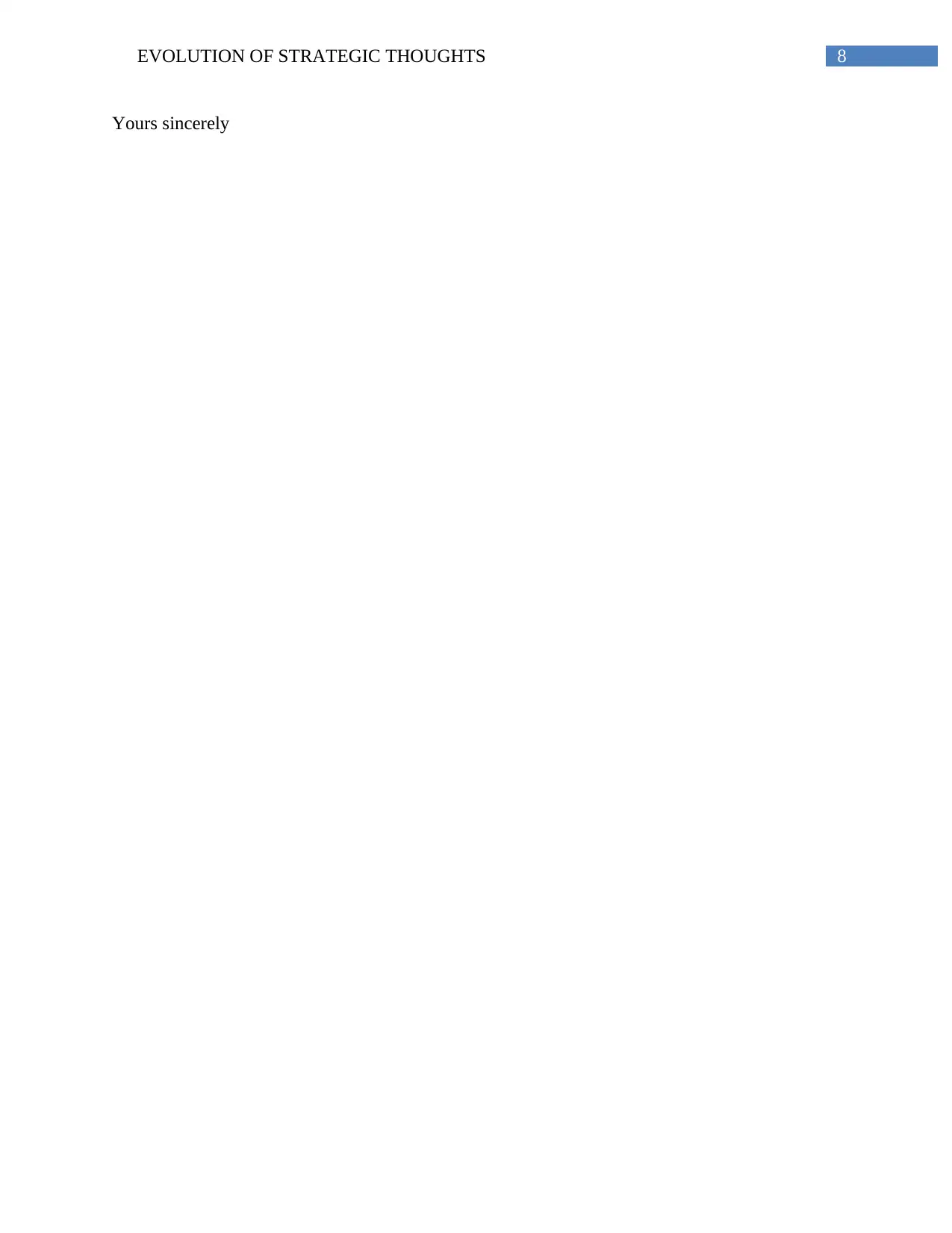
8EVOLUTION OF STRATEGIC THOUGHTS
Yours sincerely
Yours sincerely
⊘ This is a preview!⊘
Do you want full access?
Subscribe today to unlock all pages.

Trusted by 1+ million students worldwide
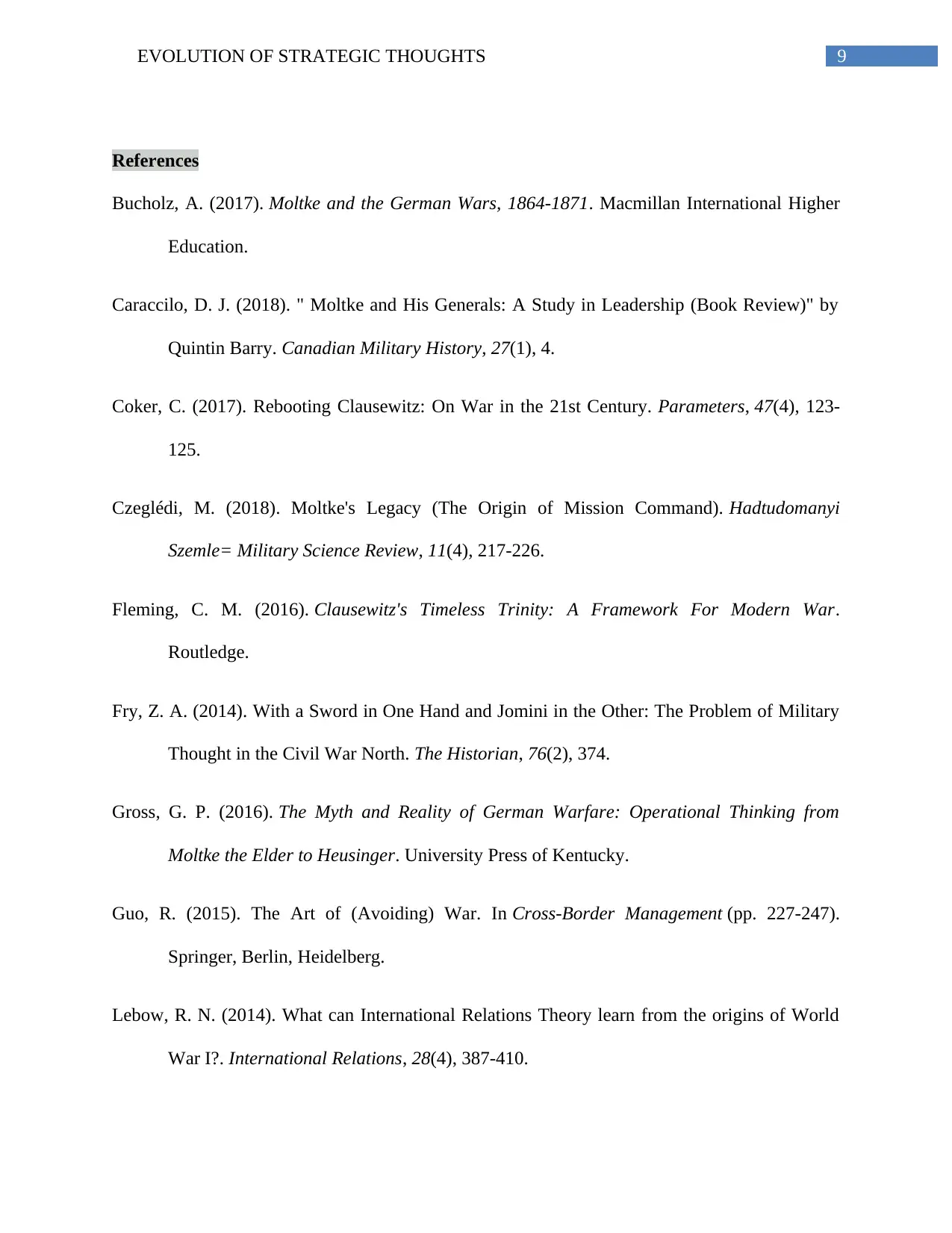
9EVOLUTION OF STRATEGIC THOUGHTS
References
Bucholz, A. (2017). Moltke and the German Wars, 1864-1871. Macmillan International Higher
Education.
Caraccilo, D. J. (2018). " Moltke and His Generals: A Study in Leadership (Book Review)" by
Quintin Barry. Canadian Military History, 27(1), 4.
Coker, C. (2017). Rebooting Clausewitz: On War in the 21st Century. Parameters, 47(4), 123-
125.
Czeglédi, M. (2018). Moltke's Legacy (The Origin of Mission Command). Hadtudomanyi
Szemle= Military Science Review, 11(4), 217-226.
Fleming, C. M. (2016). Clausewitz's Timeless Trinity: A Framework For Modern War.
Routledge.
Fry, Z. A. (2014). With a Sword in One Hand and Jomini in the Other: The Problem of Military
Thought in the Civil War North. The Historian, 76(2), 374.
Gross, G. P. (2016). The Myth and Reality of German Warfare: Operational Thinking from
Moltke the Elder to Heusinger. University Press of Kentucky.
Guo, R. (2015). The Art of (Avoiding) War. In Cross-Border Management (pp. 227-247).
Springer, Berlin, Heidelberg.
Lebow, R. N. (2014). What can International Relations Theory learn from the origins of World
War I?. International Relations, 28(4), 387-410.
References
Bucholz, A. (2017). Moltke and the German Wars, 1864-1871. Macmillan International Higher
Education.
Caraccilo, D. J. (2018). " Moltke and His Generals: A Study in Leadership (Book Review)" by
Quintin Barry. Canadian Military History, 27(1), 4.
Coker, C. (2017). Rebooting Clausewitz: On War in the 21st Century. Parameters, 47(4), 123-
125.
Czeglédi, M. (2018). Moltke's Legacy (The Origin of Mission Command). Hadtudomanyi
Szemle= Military Science Review, 11(4), 217-226.
Fleming, C. M. (2016). Clausewitz's Timeless Trinity: A Framework For Modern War.
Routledge.
Fry, Z. A. (2014). With a Sword in One Hand and Jomini in the Other: The Problem of Military
Thought in the Civil War North. The Historian, 76(2), 374.
Gross, G. P. (2016). The Myth and Reality of German Warfare: Operational Thinking from
Moltke the Elder to Heusinger. University Press of Kentucky.
Guo, R. (2015). The Art of (Avoiding) War. In Cross-Border Management (pp. 227-247).
Springer, Berlin, Heidelberg.
Lebow, R. N. (2014). What can International Relations Theory learn from the origins of World
War I?. International Relations, 28(4), 387-410.
Paraphrase This Document
Need a fresh take? Get an instant paraphrase of this document with our AI Paraphraser
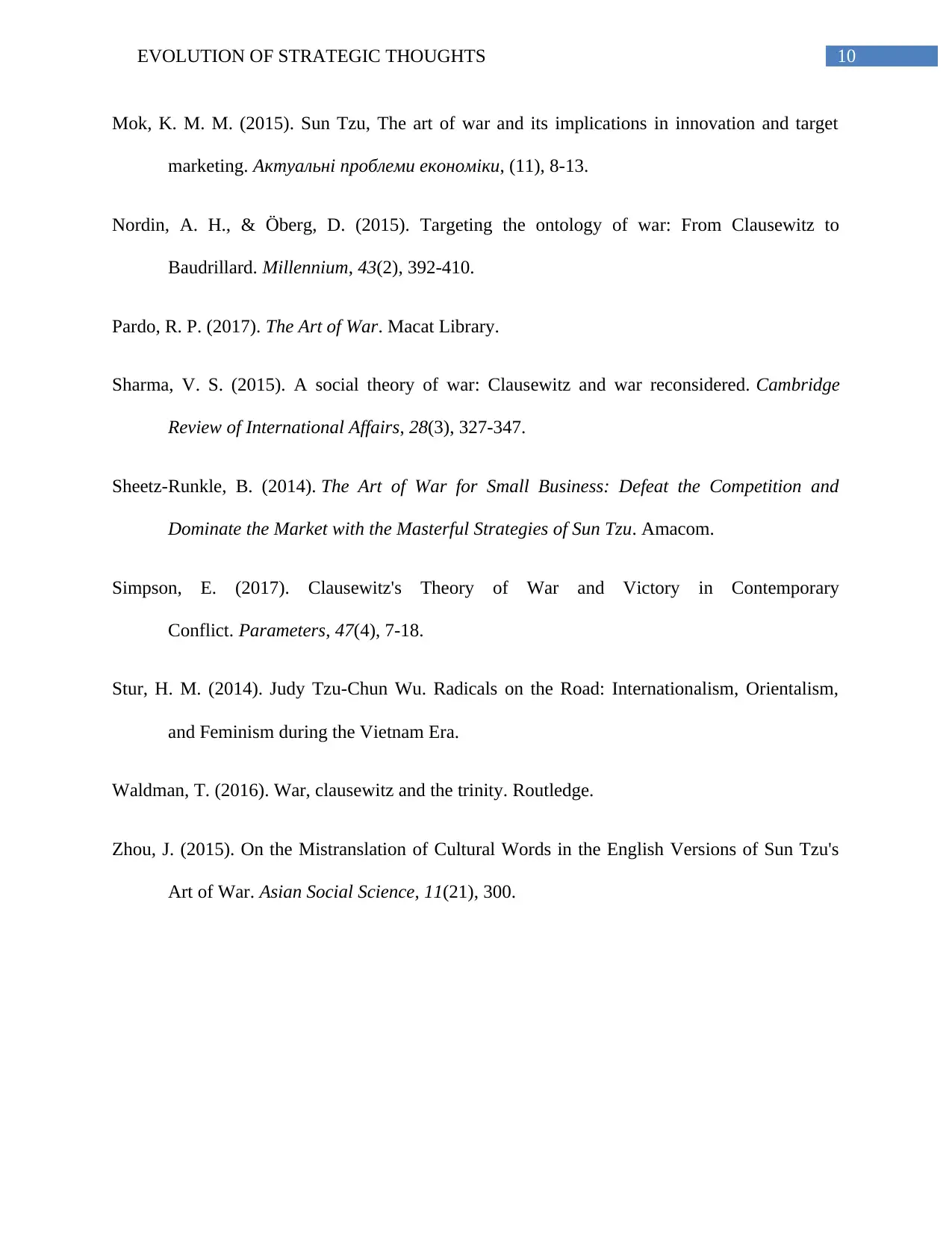
10EVOLUTION OF STRATEGIC THOUGHTS
Mok, K. M. M. (2015). Sun Tzu, The art of war and its implications in innovation and target
marketing. Актуальні проблеми економіки, (11), 8-13.
Nordin, A. H., & Öberg, D. (2015). Targeting the ontology of war: From Clausewitz to
Baudrillard. Millennium, 43(2), 392-410.
Pardo, R. P. (2017). The Art of War. Macat Library.
Sharma, V. S. (2015). A social theory of war: Clausewitz and war reconsidered. Cambridge
Review of International Affairs, 28(3), 327-347.
Sheetz-Runkle, B. (2014). The Art of War for Small Business: Defeat the Competition and
Dominate the Market with the Masterful Strategies of Sun Tzu. Amacom.
Simpson, E. (2017). Clausewitz's Theory of War and Victory in Contemporary
Conflict. Parameters, 47(4), 7-18.
Stur, H. M. (2014). Judy Tzu-Chun Wu. Radicals on the Road: Internationalism, Orientalism,
and Feminism during the Vietnam Era.
Waldman, T. (2016). War, clausewitz and the trinity. Routledge.
Zhou, J. (2015). On the Mistranslation of Cultural Words in the English Versions of Sun Tzu's
Art of War. Asian Social Science, 11(21), 300.
Mok, K. M. M. (2015). Sun Tzu, The art of war and its implications in innovation and target
marketing. Актуальні проблеми економіки, (11), 8-13.
Nordin, A. H., & Öberg, D. (2015). Targeting the ontology of war: From Clausewitz to
Baudrillard. Millennium, 43(2), 392-410.
Pardo, R. P. (2017). The Art of War. Macat Library.
Sharma, V. S. (2015). A social theory of war: Clausewitz and war reconsidered. Cambridge
Review of International Affairs, 28(3), 327-347.
Sheetz-Runkle, B. (2014). The Art of War for Small Business: Defeat the Competition and
Dominate the Market with the Masterful Strategies of Sun Tzu. Amacom.
Simpson, E. (2017). Clausewitz's Theory of War and Victory in Contemporary
Conflict. Parameters, 47(4), 7-18.
Stur, H. M. (2014). Judy Tzu-Chun Wu. Radicals on the Road: Internationalism, Orientalism,
and Feminism during the Vietnam Era.
Waldman, T. (2016). War, clausewitz and the trinity. Routledge.
Zhou, J. (2015). On the Mistranslation of Cultural Words in the English Versions of Sun Tzu's
Art of War. Asian Social Science, 11(21), 300.
1 out of 11
Related Documents
Your All-in-One AI-Powered Toolkit for Academic Success.
+13062052269
info@desklib.com
Available 24*7 on WhatsApp / Email
![[object Object]](/_next/static/media/star-bottom.7253800d.svg)
Unlock your academic potential
Copyright © 2020–2026 A2Z Services. All Rights Reserved. Developed and managed by ZUCOL.





